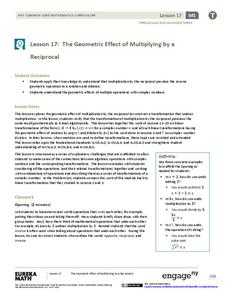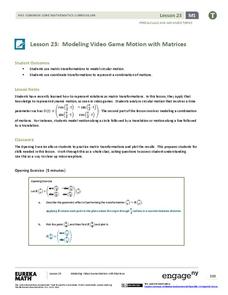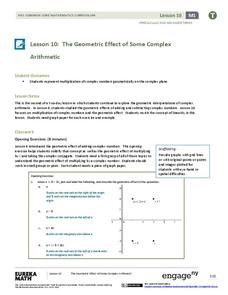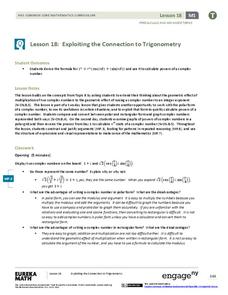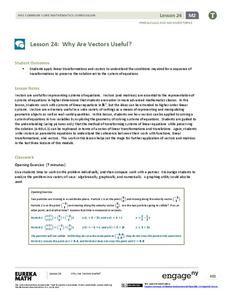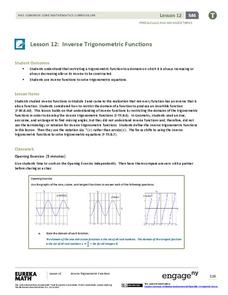Curated OER
Concepts in Precalculus 1: Trigonometry
Students investigate trigonometry. In this Algebra II/Pre-calculus/Trigonometry activity, students explore Islamic achievements in mathematics as they calculate angles and distances using the Law of Sines and the Law of Cosines. ...
Curated OER
Precalculus, Droodle Review Sheet
For this pre-calculus worksheet, students solve 20 problems in order to determine the "Droodle." Each correct answer the students achieve will be associated with a letter, that letter will be used to uncover the identity of a strange...
Curated OER
Chapter 4 Review Worksheet: Polynomial
In this polynomial worksheet, students write polynomial equations, determine the discriminant of equations, and find zeros of functions. This two-page worksheet contains 16 problems.
Curated OER
The Number System
Review complex numbers, real numbers, irrational and rational numbers, integers, and whole numbers with math students. Use this guide as a reference sheet or handout.
EngageNY
An Appearance of Complex Numbers 1
Complex solutions are not always simple to find. In the fourth lesson of the unit, the class extends their understanding of complex numbers in order to solve and check the solutions to a rational equation presented in the first lesson....
EngageNY
Trigonometry and Complex Numbers
Complex numbers were first represented on the complex plane, now they are being represented using sine and cosine. Introduce the class to the polar form of a complex number with the 13th part of a 32-part series that defines the argument...
EngageNY
The Geometric Effect of Some Complex Arithmetic 1
Translating complex numbers is as simple as adding 1, 2, 3. In the ninth lesson in a 32-part series, the class takes a deeper look at the geometric effect of adding and subtracting complex numbers. The resource leads pupils into what it...
EngageNY
Representing Reflections with Transformations
In the 16th lesson plan in the series of 32 the class uses the concept of complex multiplication to build a transformation in order to reflect across a given line in the complex plane. The lesson plan breaks the process of reflecting...
EngageNY
The Geometric Effect of Multiplying by a Reciprocal
Class members perform complex operations on a plane in the 17th segment in the 32-part series. Learners first verify that multiplication by the reciprocal does the same geometrically as it does algebraically. The class then circles back...
EngageNY
Using Permutations and Combinations to Compute Probabilities
Now that we know about permutations and combinations, we can finally solve probability problems. The fourth installment of a 21-part module has future mathematicians analyzing word problems to determine whether permutations or...
EngageNY
End-of-Module Assessment Task: Pre-Calculus Module 2
Assess pupil understanding of the relationship between matrices, vectors, linear transformations, and parametric equations. Questions range from recall to more complex levels of thinking. Problems represent topics learned throughout the...
EngageNY
Modeling Video Game Motion with Matrices 2
The second day of a two-part lesson on motion introduces the class to circular motion. Pupils learn how to incorporate a time parameter into the rotational matrix transformations they already know. The 24th installment in the 32-part...
EngageNY
Mid-Module Assessment Task: Pre-Calculus Module 2
Assess your classes' knowledge using questions that require high-level thinking and explanation. Learners use matrices to answer application questions. They also demonstrate their understanding of matrix operations.
EngageNY
Mid-Module Assessment Task: Pre-Calculus Module 5
Determine if any reteaching with a mid-module assessment task. The assessment covers the general multiplication rule, permutations and combinations, and probability distributions for discrete random variables.
EngageNY
Complex Numbers as Vectors
Show your math class how to use vectors in adding complex numbers. Vectors represent complex numbers as opposed to points in the coordinate plane. The class uses the geometric representation to add and subtract complex numbers and...
EngageNY
The Geometric Effect of Some Complex Arithmetic 2
The 10th lesson in a series of 32, continues with the geometry of arithmetic of complex numbers focusing on multiplication. Class members find the effects of multiplying a complex number by a real number, an imaginary number, and another...
EngageNY
Exploiting the Connection to Trigonometry 1
Class members use the powers of multiplication in the 19th installment of the 32-part unit has individuals to utilize what they know about the multiplication of complex numbers to calculate the integral powers of a complex number. Groups...
EngageNY
Getting a Handle on New Transformations 2
Use 2x2 matrices to move along a line. The second day of a two-day lesson plan is the 28th installment in a 32-part unit. Pupils work together to create and solve systems of equations that will map a transformation to a given point. The...
EngageNY
Exploiting the Connection to Cartesian Coordinates
Multiplication in polar form is nice and neat—that is not the case for coordinate representation. Multiplication by a complex number results in a dilation and a rotation in the plane. The formulas to show the dilation and rotation are...
EngageNY
Why Are Vectors Useful? 2
Investigate the application of vector transformations applied to linear systems. Individuals use vectors to transform a linear system translating the solution to the origin. They apply their understanding of vectors, matrices,...
EngageNY
An Area Formula for Triangles
Use a triangle area formula that works when the height is unknown. The eighth installment in a 16-part series on trigonometry revisits the trigonometric triangle area formula that previously was shown to work with the acute triangles....
EngageNY
Inverse Trigonometric Functions
Build on the understanding of finding angles using trigonometric ratios. Pupils develop the definitions of inverse trigonometric functions by restricting their domains in the 13th lesson of a 16-part series. They use inverse functional...
EngageNY
Solutions to Polynomial Equations
Take a step back to Algebra II. The first lesson in a series of 23 asks scholars to remember working with quadratic equations with complex solutions. Pupils apply polynomial identities to complex numbers and work examples that show how...
Curated OER
Precalculus: Function Models for Real-Life Situations
Young scholars use calculators and "by hand" techniques to compare models of real-life data situations, determine the best model for a situation, and use their models to make predictions.










